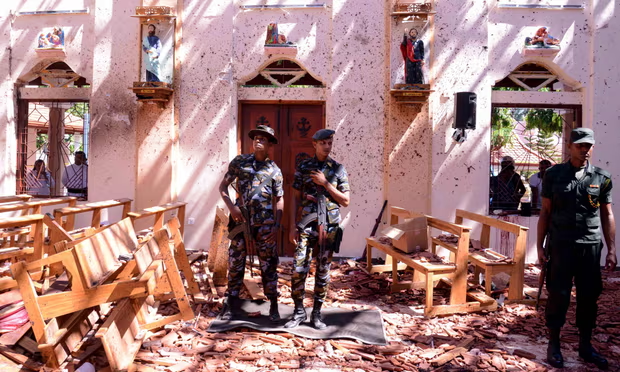Soldiers guard the bomb-damaged St Sebastian’s Church in Negombo on 21 April 2019. Photograph: AFP/Getty Images
Hannah Ellis-Petersen South Asia Correspondent/ The Guardian
Accusations are growing that the former Sri Lankan government, led by strongman president Gotabaya Rajapaksa, blocked an investigation into the country’s worst terrorist attack amid claims that they had helped orchestrate the blasts in order to return to power.
In the attacks on Easter Sunday in 2019, six suicide bombers targeted churches and luxury hotels across the country, killing 269 people, including eight British tourists.
But almost five years on, an investigation has failed to provide any answers for how the attacks took place and the security failures that led up to them. So far, there have been no criminal convictions.
Instead, people previously involved in the investigation, and the leader of Sri Lanka’s Catholic church, have alleged that inquiries were repeatedly sabotaged and obstructed by the Rajapaksa government.
In a recent documentary for Channel 4’s Dispatches, a whistleblower alleged that the attacks were part of a plan to create instability in Sri Lanka and ensure that Rajapaksa, a member of Sri Lanka’s most powerful political family, would win the presidential elections in 2019.
The source said he had helped an intelligence officer with close ties to the Rajapaksa family meet members of the local Islamist militant group, National Thowheeth Jama’ath (NTJ), that carried out the attack. He said it had been part of a plan that had been hatched over a couple of years to create an “unsafe” security situation that would help bring Rajapaksa to power.
The Rajapaksa family had ruled Sri Lanka for almost a decade from 2005. They were credited with ending its bloody, 26-year-long civil war but became notorious for their authoritarian methods, including the use of “death squads” to target critics and journalists.
Mahinda Rajapaksa was ousted in 2015 after a backlash against alleged corruption, but the family had planned a return to power in the 2019 election, this time with younger brother Gotabaya as the presidential candidate.
He won the election but was toppled dramatically from power in July last year, after the country experienced a catastrophic economic crisis, and replaced by Ranil Wickremesinghe, who is seen as close to the Rajapaksa family.
The targeting of those involved in the investigation took a murkier turn this month after the attorney general told the courts that there had been a conspiracy to murder Shani Abeysekara, the former head of Sri Lanka’s CID, who was overseeing the investigation before he was suddenly removed when the Rajapaska government came to power.
A court petition filed by Abeysekara, which was taken up this month, said a plan to kill him in a staged vehicle accident had been uncovered. The petition identifie dhis involvement in the bombing investigation as one of the reasons for the assassination attempt.
Upul Jayasuriya, the lawyer representing Abeysekara, said that his client’s involvement in the Easter bombing investigation was “one of the biggest problems”. Still fearful for his life, Abeysekara declined to comment directly on the case.
Last year, Abeysekara went public with allegations that prior to the attacks – when the CID was already investigating NTJ militants – state and military intelligence officers had sabotaged the investigation and “fabricated” evidence to divert investigators away from the group, including ringleader Zahran Hashim, who later carried out one of the suicide bombings.
He has also alleged that his attempts to raise the issue of NTJ militants with the national security council had been obstructed. After the Easter bombings, he said, his investigators had established links and vidence of communication between intelligence officials and members of the NTJ group that carried out the attacks.
Courtesy The Guardian.
